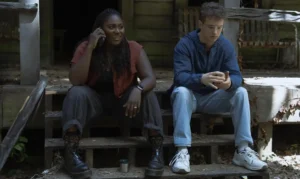Mirror, Mirror is best explained through the eyes of its four main characters, as the facade they present to people is different than their inner thoughts. Those revelations come out when they look into a mirror, and they get the truth about their lives that they cannot face from our mouths.
Álvaro (Santi Millan) is an arrogant, full-of-life executive who is all flash but lacks substance in. Even in the bedroom, as his latest lover looks into a mirror when he is in the bathroom, the reflection comments back to her how awful the romance was. He is almost 50 and is concerned with the company’s direction as the world of cosmetics is changing. He is going through his midlife crisis, as his reflection speaks to his unhappiness in his life and not reaching self-fulfillment.
Paula (Natalia de Molina) is a creative type working as an ambitious assistant to a marketing executive at the company. Paula’s sister, Cristina, is critical of her. Her latest commercial is highly nonbinary, which she has a tough time relating to. Either way, she places the video online. And this causes objections from Alberto, who just wants supermodels to model for his cosmetics line. He later changes his mind as she educates him about today’s population, which reflects the nonbinary umbrella. Even the company’s current antiquated mindset of marketing to a CIS population. (A term that means whatever gender you are now is the same as what was presumed for you at birth.)
Cristina may be overcompensating. As she questions the nature of her sister’s advertisement, she daydreams about having masculine, muscular arms in her aerobics class. She sees herself in the mirror as a man, not a woman. Cristina is married with kids and feels trapped. She watches “they/them” social media posts that cause her to go running to her therapist. Instead of a mirror evoking her inadequacies, she daydreams about her therapist bluntly, telling her how frustrated she is with her, including her laziness to evolve and coming to her trips with her gender identity issues.
Alberto (Carlos Areces) is a 40-ish overweight, sensitive, and insecure manager who loves the silky smooth, vibrant, and uplifting tone of Glenn Medeiros’s Nothing Will Change My Love for You. (I mean, who doesn’t?) He also has a crush on the much younger Paula. But he is a multitasker.
How? Well, he has a busy job and a packed schedule. Yet, he finds time to jerk off to her social media posts in the company bathroom. Alberto’s transformation is the most fun, as he changes from a loveable loser to an overconfident and even brutish man of action. He eventually embraces his spontaneous, natural self, so much so that he sparks a connection with the building receptionist, Atonia (Betzy Turnez).
Near the film’s end, Crehuet has the reality set in for Paula. She is now the star pupil at the company, but all these changes are coming to light for these characters. Her sister, now Cristian, runs up to her, now dressed and embodied as their natural self. This is a lot for her to handle. Álvaro runs up to her and begs Paula to tell him who he is inside.
Atonia is denied entry to the company party by a beautiful hotel customer service employee, and we presume it may be because of her looks. Eventually, guy Alberto, confident as ever, professes his love for Paula with the passionate help of that sweet bastard Glenn Medeiros’ lyrics. The stones on this guy now. He even tries to kiss her twice.
A fire then breaks out. We think it was lit by Atonia. Why? The last thing Paula sees is her laughing while the fire climbs up the wall. She turns to Paula and quotes the line of her social media ad. “Be free, be you!” You will also notice when the fire starts, Alberto hilariously pushes past Paula to save himself.
I am somewhat perplexed by Crehuet’s film. For instance, for what the film stands for, when all the changes come about, especially with Paul’s sister, she seems disturbed by Cristian’s transformation and not at all supportive. Considering the Human Rights Watch reported on Spain’s rejection of a bill that would have been a landmark legislative proposal that would have allowed legal gender recognition based on self-determination, does this reflect Spain’s values?
More likely, the filmmaker may speak to the closemindedness, one unwilling to change, and some young people’s “woke” values of being only surface level. The film’s end has Alvaro losing his job, but he now feels free, unshackled from the restraints of needing to achieve success to live up to his mother’s view of him being perfect. Cristian still embraces their new identity. Alberto is lost, being caught between his natural insecurities and confidence the world won’t accept from a man who looks like he does.
And finally, Paula compromises her values to take on Alvaro’s job because now the leadership is questioning if the company is moving too fast in this particular direction. So, she pivots, saying they can market directly to minorities but leaving out progressive maneuvers of targeting members of the LGBTQ+ community. After all, as she tells them, this is about selling makeup.




